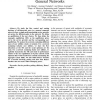Free Online Productivity Tools
i2Speak
i2Symbol
i2OCR
iTex2Img
iWeb2Print
iWeb2Shot
i2Type
iPdf2Split
iPdf2Merge
i2Bopomofo
i2Arabic
i2Style
i2Image
i2PDF
iLatex2Rtf
Sci2ools
JSAC
2006
2006
Efficiency and Braess' Paradox under pricing in general networks
We study the flow control and routing decisions of self-interested users in a general congested network where a single profit-maximizing service provider sets prices for different paths in the network. We define an equilibrium of the user choices. We then define the monopoly equilibrium (ME) as the equilibrium prices set by the service provider and the corresponding user equilibrium. We analyze the networks containing different types of user utilities: elastic or inelastic. For a network containing inelastic user utilities, we show the flow allocations at the ME and the social optimum are the same. For a network containing elastic user utilities, we explicitly characterize the ME and study its performance relative to the user equilibrium at 0 prices and the social optimum that would result from centrally maximizing the aggregate system utility. We also define Braess' Paradox for a network involving pricing and show that Braess' Paradox does not occur under monopoly prices.
Related Content
| Added | 13 Dec 2010 |
| Updated | 13 Dec 2010 |
| Type | Journal |
| Year | 2006 |
| Where | JSAC |
| Authors | Xin Huang, Asuman E. Ozdaglar, Daron Acemoglu |
Comments (0)

